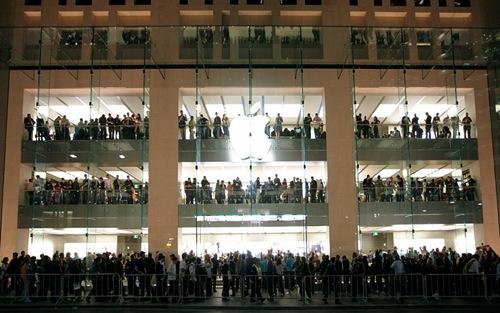The Australian Tax Office has hit Apple with a $28.5 million bill for back taxes, in what is viewed as a sign that the country may start cracking down on foreign tax havens.
Details on the $28.5 million bill are unknown, as it is illegal for the ATO to comment on individual cases. But the Brisbane Times reported on Friday that the ATO may be joining a tax push led by European governments targeting companies that shelter funds through intermediary companies in foreign countries.
Apple's Australian arm is owned by Apple Operations International, which is a subsidiary located in Cork, Ireland. Many companies have operations in Ireland to capitalize on the country's low corporate tax rate.
Last year, Apple earned $4.87 billion in revenue from Australia. Its total tax bill for its 2011 fiscal year was $94.7 million.
Apple's store in Sydney, Australia.
European governments have been looking to collect taxes from companies that rely on foreign tax havens. This week, the French government demanded $252 million in back taxes from Amazon, which relies on a tax haven in Luxembourg.
Apple sells devices to customers in Australia, but companies such as Google and eBay won't even admit to dealing with customers down under.
"Instead, according to its most recent report, Google Australia provides 'research and development services' to its U.S parent and 'sales and marketing services' to Google companies in Ireland and Singapore," the Brisbane Times reported. "For its part, eBay Australia and New Zealand's annual report discloses its principal activities as "the recommendation of market penetration strategies and advertising and promotion activities."
Apple also came under fire from regulators in Australia earlier this year, when the company was slapped with a $2.3 million fine for falsely advertising the 4G LTE capabilities of the third-generation iPad. The Australian Competition and Consumer Commission took issue with Apple's promotional materials which claimed the device offered 4G connectivity. But the ACCC felt the ads misled customers into thinking the device would work on Long-Term Evolution networks in Australia.
 Katie Marsal
Katie Marsal








 Malcolm Owen
Malcolm Owen
 William Gallagher
William Gallagher

 Wesley Hilliard
Wesley Hilliard



 Christine McKee
Christine McKee




-m.jpg)




66 Comments
If they purposely set themselves up so as to legally avoid taxes, how can these governments suddenly find a way to tax them?
And rightly so, they should pay a fair amount of tax. Having said that governments need to remove the loop holes that allow this type of legal tax dodging in the first place.
If they purposely set themselves up so as to legally avoid taxes, how can these governments suddenly find a way to tax them?
I would imagine by removing the legality of the actions they undertook.
And rightly so, they should pay a fair amount of tax.
And once again we start a thread where someone pretends that there is an objective "fair amount" of tax.
Ah, you mean the "loopholes" that are perfectly legal and of which every single person and entity in their right mind takes advantage. Got it.
Do you really want 70% tax on everything?
But you can't retroactively change the law, surely?
Only entities with a large accounting department have the ability to take advantage of most of these tax loopholes. Starbucks can route its profits through a tax haven. Your local independent coffee shop cannot. It's not a level playing field.